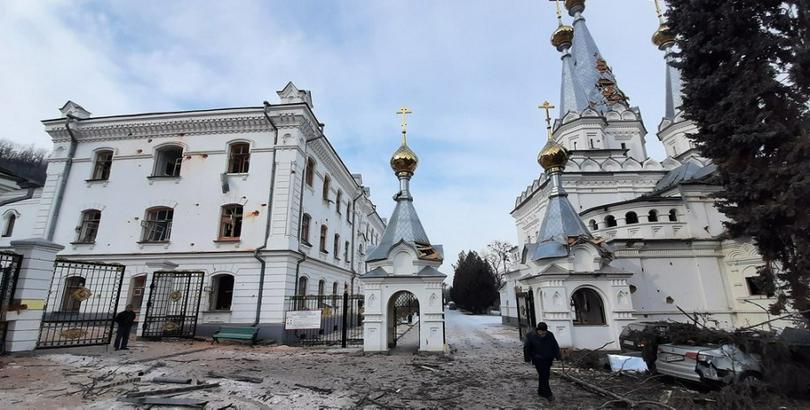The World Evangelical Alliance (WEA), the European Evangelical Alliance (EEA), and the Council of Evangelical Protestant Churches of Ukraine (CEPCU) are all working together to make a statement about Ukraine one year after the full-scale Russian invasion began. The statement comes before a partnership summit that will take place in Poland from March 1–3, 2023, and bring together important leaders from Ukraine, Europe, and other parts of the world. The goal of the meeting is to make it easier for Evangelicals around the world to deal with major crises by responding to and learning from the situation in Ukraine.
One year has passed since Russia launched a full-scale invasion of Ukraine. The WEA joins the EEA and the CEPCU in condemning the aggression, honoring the people who are pouring out support for the victims, and challenging all evangelicals to follow Jesus as the war continues to rage.
Above all, we repeat our call for the immediate withdrawal of all Russian forces from Ukraine within its internationally recognized borders as the quickest way to end the war. The invasion of Ukraine is both unjustified and unprovoked. Claims that the attack was necessary to protect ethnic Russians in Ukraine and stop Ukraine from threatening Russia are completely false. We pray that world leaders will not reward aggression but will have the wisdom to find solutions that build lasting peace. Such unprovoked attacks must never happen again.
In the past twelve months, millions of people in Ukraine have been displaced, have lost loved ones, or have been affected in other ways. To those who grieve and struggle in impossible circumstances, we stand with you in solidarity. It is our prayer that a just peace would come quickly, that you may begin to heal and rebuild, and that even through your pain, you may tangibly experience God’s presence (Ps. 34:18).
How can we follow Jesus at this moment, individually and collectively as Christ’s Church? We look to amazing men and women in Ukraine, across Europe, especially those in bordering countries, and throughout the world who are pouring out their compassion, support, and often their very lives for those affected by the war. We pray for those who help people on the front lines and all over Ukraine in many different ways, like opening churches as hubs of response, giving humanitarian aid and medical help, providing trauma therapy and counseling, and telling everyone, even their enemies, that God loves them. Their lives inspire and challenge all of us, no matter who we are or where we live, to follow Jesus. We call on all Christians today, and indeed all peoples, to join this work as Christ’s hands and feet to heal, restore, and make all things new, from Ukraine to Turkey and Syria and beyond.
We know that many Christians in Russia are agonizing as well, wondering what following Jesus looks like when they are part of a community that is inflicting harm on others. Jesus tells us to stand up for those who are weak, even if it means going against our own group and leaders. Throughout the history of the Church, courageous Christians have done just that, while many have overlooked or supported the hostile actions of their national or ethnic groups against others. In today's global and interconnected world, we call on all Christians, no matter where they live, to intentionally turn to God by thinking about how our own groups may be causing harm and then holding our governments, social groups, and even church communities accountable for what they do or don't do.
We continue to pray that the Spirit will empower the Church to stand with and provide care to all those who are vulnerable, in Ukraine and beyond. May God grant us the strength and courage to recognize when our group is causing harm to others so that we might stand with those who are hurting. May we have ears to “… hear what the Spirit says to the churches. (Rev 2:29)”
The Council of Evangelical Protestant Churches of Ukraine is a group that brings together 10,000 Ukrainian churches from 12 different religious groups. Its goal is to work together to protect and strengthen freedom of religion and conscience, religious equality, and Christian morals and values. The Evangelical Churches of Ukraine, which are members of the Council, speak with one voice and take the same position.
The European Evangelical Alliance (EEA) was founded in 1951. The purpose of the EEA is to promote unity and a sense of evangelical identity, as well as give Europe's 23 million evangelical Christians a voice and a place to talk. The goal of the EEA is to bring people together for a common goal, give them the tools they need to do a complete job, and speak with one voice. It is a grassroots movement representing all Protestant traditions in 36 European countries. The EEA's office in Brussels encourages its members to be good citizens and speaks for them before European institutions.
Over two billion Christians in the world today are represented by three world church bodies. The World Evangelical Alliance (WEA) is one of them, serving more than 600 million evangelicals who belong to churches that are part of 143 national Evangelical Alliances in nine regions. The WEA was started in London in 1846. It brings evangelicals from different denominations together for prayer, evangelism, mission, theological education, religious freedom, fighting for human rights, and working on a wide range of social issues. It speaks with one voice to the United Nations, governments, and media in public or through behind-the-scenes diplomacy on issues of common concern to the church.
Originally from Webpage: "worldea.org"
CCD edited and reprinted with permission












